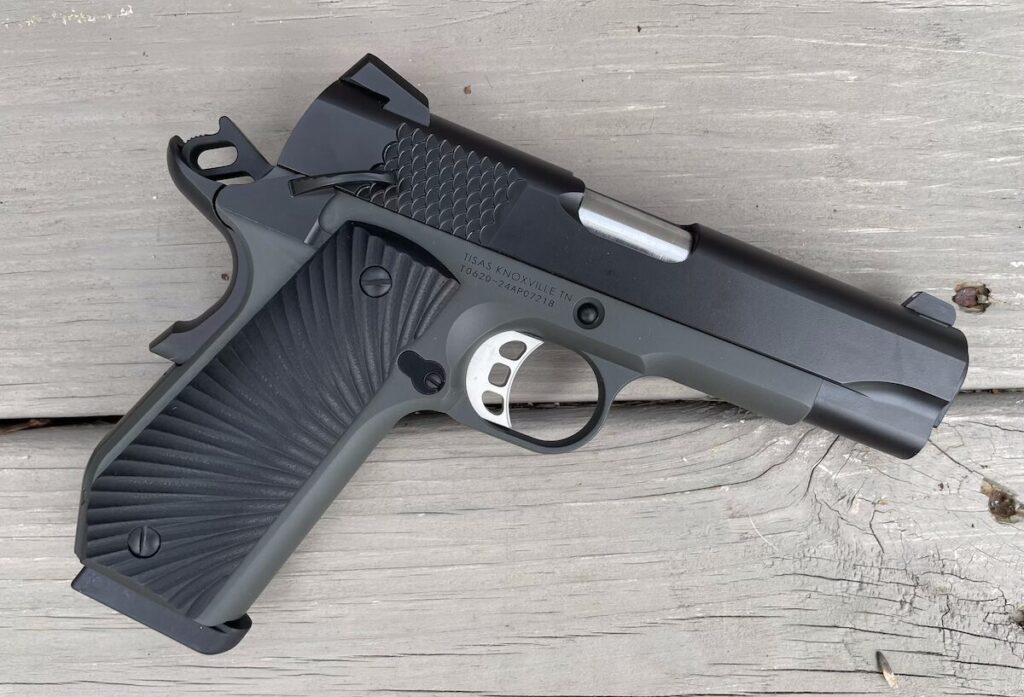When it comes to 1911 pistols, Tisas might not be the first name that pops into your head. They’re still the new kid on the block here in the U.S., but they’re quickly earning their stripes. Tisas offers a surprising variety of 1911s—from double-stack 9mm models to Mil-Spec GI-style pieces, optic-ready configurations, and concealed carry designs.
One such concealed carry gem is the Tisas 1911 Stingray Carry. This pistol sports features you’d expect on semi-custom or custom 1911s, but at a price that won’t leave your wallet gasping for air. Think bobtail frame, scalloped slide serrations, an undercut trigger guard, and ambidextrous thumb safety—all without that “custom gun” price tag.
The Stingray’s bobtail grip is its standout feature. For those unfamiliar, a bobtail grip basically turns a full-size 1911 into a round-butt pistol, which makes it less likely to print under your shirt. It’s a clever trick that shaves off a bit of weight and enhances concealability. Normally, you’d have to visit a custom gunsmith for this kind of treatment, so seeing it standard on a budget 1911 is a nice surprise.
I know what you’re thinking: “You get what you pay for.” Fair point, but Tisas has a way of defying that logic. I’ve put several Tisas 1911s through their paces—9mm, .45 Auto, and 10mm Auto—and they’ve consistently impressed me. Sure, a couple needed a little break-in time, but hey, 1911s are notorious for being temperamental straight out of the box.
The Stingray Carry is a commander-sized 1911, meaning it boasts a full-size frame with a slightly shorter 4.25-inch barrel. It sticks with the tried-and-true Series 70 mechanism, giving the trigger a cleaner feel compared to a Series 80. Speaking of triggers, Tisas went with a standard GI-style recoil spring setup, so the Stingray cycles like a classic 1911.
Out of the box, the Stingray arrives in a hard case with two 8-round steel magazines (complete with rubber bumper pads) and a bushing wrench. The two-tone Cerakote finish—grey frame and black slide—looks sharp and feels well done. All the controls, minus the trigger, are finished in matching black Cerakote.
The Stingray sports G10 grips with a sunburst texture that strikes a nice balance—grippy enough for control, but not cheese-grater rough. A handy “speed groove” in the left grip panel makes accessing the mag release easier, which comes in handy during fast reloads.
For sights, you get tried-and-true Novak-style 3-dot sights. These provide a crisp sight picture that’s quick to acquire, even under pressure. The front sight is dovetailed, and the rear sight is adjustable for windage and locked in place with a set screw.
The Stingray’s skeletonized trigger pulls at a hefty 6 pounds—a bit on the heavy side for a 1911, but understandable for a concealed carry pistol. There’s about an eighth of an inch of take-up before you hit the wall, followed by a crisp break. It’s manageable, but you might have to pay extra attention to your trigger control at high speeds.
I started my accuracy test at 15 yards from a rest, running 230-grain FMJ ball ammo from Blazer and Remington UMC. For defense loads, I used Hornady Critical Duty 45 Auto +P with a 220-grain FlexLock bullet. Average accuracy for five-shot groups hovered around 3.2 inches. Blazer scored a best group of 2.89 inches, while Hornady Critical Duty managed a tidy 2.90 inches. That’s respectable accuracy for a carry gun in this price range.
Out of the box, I experienced three failure-to-feed (FTF) malfunctions within the first 150 rounds. After that, the Stingray ran like a sewing machine. I tested it with magazines from Colt, Springfield Armory, and Wilson Combat, and the Stingray digested them all without a hiccup.
The ambidextrous thumb safety features extended paddles that click on and off with satisfying precision. The grip safety’s high sweep and speed bump ensure positive deactivation even with a sloppy grip.
The Stingray’s controls are generally solid, but I do wish Tisas had added some texture to the front and rear grip straps. Without it, I found myself adjusting my grip during rapid fire, especially with snappier +P loads. It’s manageable, but a bit of checkering would have gone a long way.
I carried the Stingray in a Black Point Tactical Mini WING IWB holster, which paired nicely with the bobtail design. The pistol sat snug against my body, and the bobtail grip lived up to its promise of improved concealability. Those 8-round magazines with bumper pads? Great for training but less ideal for concealed carry. If I carried the Stingray daily, I’d swap in flush-fit 8-round mags for a lower profile.
During drills, the Stingray proved itself capable. I ran modified Failure Drills, mixing up round counts to force unexpected reloads. The Stingray’s slide stop was smooth, and the magazine ejection was swift—like that one girl in college who dumped me without a second thought. Fast and with no regrets.
With a street price between $450 and $500, the Tisas 1911 Stingray Carry offers an impressive mix of features and performance for budget-conscious shooters. The bobtail design makes it a strong contender for concealed carry, and while the grip texture leaves room for improvement, that’s easily fixable with some grip tape or a quick gunsmith visit.
If you’re looking for an affordable entry point into the world of 1911 bobtail pistols, the Stingray Carry is worth your consideration. Just remember: it’s not a custom pistol, but for the price, you’re getting a serious contender that’s ready to run after a proper break-in. As far as budget-friendly 1911s go, this Stingray’s got some serious sting.



